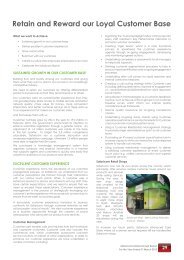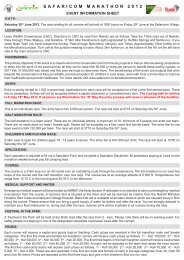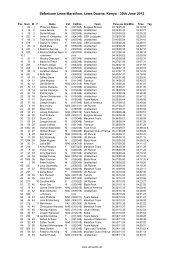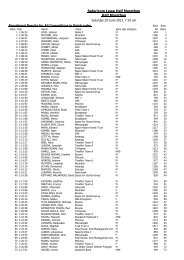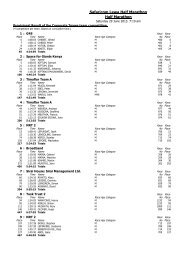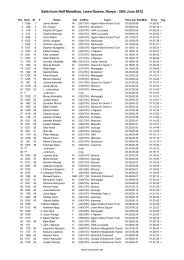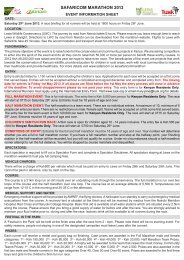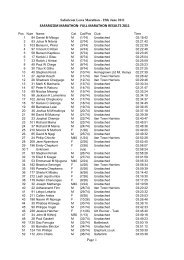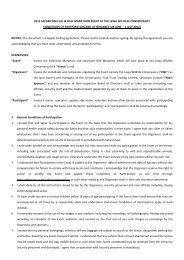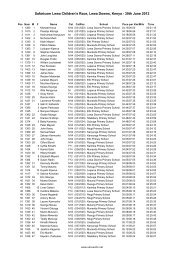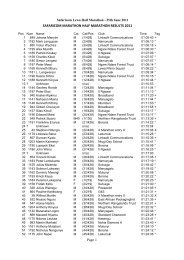Sustainability Performance: At a glance (31 March 2012) - Safaricom
Sustainability Performance: At a glance (31 March 2012) - Safaricom
Sustainability Performance: At a glance (31 March 2012) - Safaricom
Create successful ePaper yourself
Turn your PDF publications into a flip-book with our unique Google optimized e-Paper software.
Environmental performance<br />
We do not have targets or benchmarks for carbon emissions<br />
performance data yet, but these will be defined going forward.<br />
We are, nonetheless, already taking steps to manage our<br />
carbon emissions through initiatives aimed at improved<br />
generator usage and operational energy efficiency.<br />
• Water<br />
<strong>Safaricom</strong> receives water from three sources for its daily<br />
operations: the municipal council, boreholes and tanker water<br />
supplies. For the reporting period, the company consumed 57<br />
420 000 litres of water — 43 272 000 in litres from the municipal<br />
council and 14 148 000 litres via tanker delivery. We do not have<br />
targets or benchmarks for water consumption performance data<br />
yet, but these will be defined going forward.<br />
Water conservation measures<br />
In order to minimise water wastage, the company has installed<br />
sensor taps in the <strong>Safaricom</strong> Care Centre building washrooms<br />
and these will be rolled out to all other company facilities<br />
over the next three years. Borehole supplies are also used to<br />
supplement the local council water supplies at <strong>Safaricom</strong> House<br />
I and II and the Jambo Contact Centre. Rain water collection<br />
systems will be considered for any new company facilities and<br />
plans are also underway for the construction of a borehole to<br />
supplement the existing water supplies at the <strong>Safaricom</strong> Care<br />
Centre.<br />
• Waste management<br />
The Environmental Management and Coordination (Waste<br />
Management) Regulations provide guidelines on the handling,<br />
packaging, treatment, condition, storage and disposal of waste.<br />
Waste generators are responsible for ensuring the segregation<br />
at source, collection and proper disposal of their waste streams.<br />
We have contracted a NEMA-certified waste collection company<br />
to handle the office waste and all other waste, including IT/<br />
Network waste, is also disposed of in accordance with the waste<br />
management regulations.<br />
Network waste<br />
Waste generated by <strong>Safaricom</strong> BTSs forms part of the e-waste<br />
management programme. Batteries and engine oils are returned<br />
to the suppliers for recycling (at an average of 75 generator<br />
starter batteries and 1 550 litres of engine oil a month).<br />
Site batteries are returned to the warehouse, with Logistics<br />
responsible for declaring them obsolete and disposing of them<br />
as per set procedures.<br />
No accidental major spills have been recorded yet, but secondary<br />
containment facilities have been installed at the MSR stations and<br />
certain BTS sites have been provided with bunded areas.<br />
IT waste<br />
The <strong>Safaricom</strong> Foundation and Computers for Schools Kenya<br />
(CFSK) have partnered in the refurbishment of computers<br />
that have nil net book value to <strong>Safaricom</strong>. The Finance,<br />
Supply Chain and IT departments are involved in the<br />
clearance process of old computers and laptops. An inventory<br />
has been developed and is maintained by the IT department<br />
on the number of PCs and laptops that have been handed<br />
over to CFSK. Going forward, an agreement will be drafted<br />
stipulating the roles and responsibility of <strong>Safaricom</strong> and CFSK<br />
in the management of IT waste.<br />
<strong>Safaricom</strong> has also piloted a handset recycling programme<br />
aimed at managing the environmental impact of old mobile<br />
devices and accessories, which might otherwise end up in<br />
landfills. The collected phones and accessories are recycled<br />
by CFSK.<br />
Paper and resource management<br />
<strong>Safaricom</strong> started to manage its paper consumption in 2008.<br />
To minimise paper usage, printing and photocopying are only<br />
recommended when absolutely necessary and printers are<br />
set to duplex printing by default. All shredded waste paper is<br />
sold to Chandaria Industries for recycling.<br />
Solid waste management<br />
<strong>Safaricom</strong> employees and contractors are encouraged to<br />
adopt the waste management hierarchy — prevention,<br />
minimisation, re-use, recycling, energy recovery and,<br />
finally, disposal — to promote waste minimisation within<br />
our workplaces and to encourage re-use and/or recycling<br />
wherever possible.<br />
Waste is separated to promote recycling and composting<br />
of biodegradable waste. All waste is collected by a NEMAlicensed<br />
waste handler/collector. We avoid the use of<br />
non-recyclable plastic containers and substitute thin plastic<br />
containers with durable containers.<br />
We do not have targets or benchmarks for waste<br />
management performance data yet, but these will be defined<br />
going forward.<br />
• Electromagnetic Frequencies<br />
<strong>At</strong> <strong>Safaricom</strong>, we are committed to ensuring that our activities<br />
and services pose no risk to the health and safety of the<br />
communities in which we operate. Even though there is no<br />
evidence that the electromagnetic waves emitted by mobile<br />
phones and base stations are dangerous, we take our<br />
responsibilities seriously and comply with the World Health<br />
Organisation (WHO) recognised, International Commission<br />
on Non-Ionizing Radiation Protection (ICINRP) guidelines.<br />
All of our BTSs have been subjected to<br />
comprehensive actual EMF measurements<br />
and we ensure that the radio equipment we<br />
use is approved and within the internationally<br />
recommended EMF range. We are compliant<br />
with all regulations and have conducted all EIAs<br />
and EAs as required by NEMA.<br />
We have also developed a website answering<br />
the frequently asked questions about mobile<br />
phones, masts and your health, available using<br />
the QR code on the left or via our website at<br />
www.safaricom.co.ke. All handsets sold in<br />
<strong>Safaricom</strong> shops have been ‘type approved’<br />
and fall way below the required international<br />
standards.<br />
• Infrastructural impacts<br />
In the past year, <strong>Safaricom</strong> has developed 300<br />
BTS sites across the country. Before a BTS or<br />
other facility is developed by <strong>Safaricom</strong>, an EIA<br />
is conducted to ensure that the development<br />
is environmentally sound and sustainable and<br />
that environmental consequences have been<br />
recognised and taken into account.<br />
After one year of project existence, we conduct<br />
an Environment Audit (EA) of the site. The<br />
objectives of the EA include: identifying any<br />
public concerns and significant environmental<br />
impacts (and establishing mitigation measures,<br />
if required); assessing compliance with all<br />
relevant statutory and regulatory requirements<br />
(measuring air emissions, noise and vibrations,<br />
waste management processes, electromagnetic<br />
emissions, energy consumption, discharges<br />
into the aquatic environment and land/ground<br />
contamination), as well as facilitating the<br />
management and control of environmental<br />
practices.<br />
So far, all of our facilities and BTSs have been<br />
subjected to an EA and all new developments<br />
are subjected to an EIA. We have 1 390 EIA<br />
approvals for our BTSs and approximately 2<br />
000 EA approvals from NEMA in total.<br />
Environmental performance<br />
Milestones and successes<br />
• We launched the handset and<br />
accessories recycling programme<br />
in advance of any e-waste regulations.<br />
The modalities of the project are in<br />
discussion with NEMA, key internal<br />
stakeholders and CFSK.<br />
• We were awarded the most compliant<br />
company in the telecommunication<br />
sector by NEMA, following negotiated<br />
compliance to EMCA 1999 and<br />
subsequent regulations.<br />
• We have installed the IsoMetrix system<br />
and implemented an automated<br />
Environmental Management System<br />
(EMS).<br />
• We successfully launched the Green<br />
Awareness Day and showcased our<br />
green initiatives across the business. A<br />
launch for the JCC is in progress.<br />
• We designed and disseminated an<br />
EMF communication info-pack<br />
‘The Answer is in your Hand: Mobile<br />
Phones, Masts and your health’.<br />
100 <strong>Safaricom</strong> <strong>Sustainability</strong> Report <strong>2012</strong><br />
<strong>Safaricom</strong> <strong>Sustainability</strong> Report <strong>2012</strong> 101



